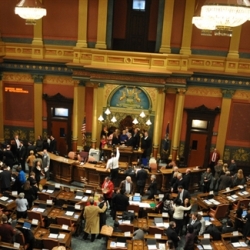Michigan House Passes Lawful Internet Gaming Act

The Michigan House of Representatives passed the Lawful Internet Gaming Act in a 68-40 vote on Tuesday, June 12, 2018. This bill, also called HB 4926, outlines a framework for regulated online casino and poker games within the state, but must still must go through a vote in the Michigan Senate and be signed by the governor before it becomes law.
About the Act
The Lawful Internet Gaming Act would allow Michigan casinos to apply for licenses from a newly created Division of Internet Gaming within the Michigan Gaming Control Board. The three commercial casinos in Detroit will be able to apply as soon as the applications process is opened, but the Michigan tribes that operate casinos on their lands would instead have to renegotiate their existing gaming compacts to include online gambling.
License holders would have the right to run poker games online, and the Division is directed to come up with a list of other games to be permitted. It’s almost certain that casino table games, slots and video poker will be included in this category.
The bill stipulates that the Division may allow licensees to permit online sports betting “if that internet wagering is not prohibited by federal law.“ This is a reference to the recent Murphy decision of the Supreme Court, which overturned the longstanding federal ban on sports betting contained within the 1992 PASPA legislation. Now that there’s nothing preventing individual states from authorizing betting on sports over the internet, Michigan is positioning itself to enter this field.
Fees and Taxes
The costs involved in maintaining a Michigan internet gaming license, as laid out in the text of the bill, are not trivial. Commercial organizations looking to offer online gambling services would have to pay:
$100,000 at the time of applying for a license
$200,000 upon the granting of a five-year license
$100,000 per year after the license is issued
8% monthly tax on gross gaming revenue
Reducing the financial sting somewhat are vague indications that all or part of the application fee could be refunded. Furthermore, five-year license renewals would not necessitate the paying of the initial $300,000 investment (application + license fee) again.
The federally recognized Michigan tribes that currently offer land-based gaming would not have to pay these fees. Instead, the terms of their participation would have to be hashed out in negotiations with the governor. However, this online gambling legislation strongly hints that the signing of new compacts or extensions of existing compacts would be tied to a tribe’s readiness to share online gaming revenue with the state.
Those who intend to supply the technological solutions to run the games would also have to be licensed. Providers of an internet gaming platform, which refers to an “integrated system of hardware, software, and servers,” would be required to hand over $100,000 for a license along with $50,000 annually. Vendors of parts of an online gaming solution rather than the whole setup would only have to pay $5,000 upon licensure and $2,500 per year. Both types of licensees would also pay nonrefundable application fees, which will not exceed $5,000.
Where Will the Money Go?
The 8% tax levied on gross gaming revenue will be split up with 55% going to the city in which the licensee is located, 5% for Michigan’s state school aid fund, 5% toward the Michigan transportation fund and 35% to the internet gaming fund. This last fund will be created within the state treasury, and all application and license fees would be paid into it as well. $1 million of the cash in this fund would annually be devoted to combating problem gambling while the rest of it will be available for the Michigan Gaming Control Board (MGCB) to cover the costs involved in regulating and enforcing the provisions of the bill.
Michigan Online Poker Player Sharing Possible
The text of the legislation says that “The division may enter into agreements with other jurisdictions to facilitate, administer, and regulate multijurisdictional internet gaming.” This is likely irrelevant to casino games, but it’s very important for internet poker. New Jersey, Delaware, and Nevada already have a poker liquidity sharing agreement in place, and Pennsylvania might join it sometime soon. If Michigan jumps aboard too, then it will add its 10 million residents to the potential player pool.
Poker games depend upon a steady stream of players to keep cash tables running and to grow tournament prize pools. The introduction of Michigan to the existing online gambling compact will therefore positively impact not only the Wolverine State’s own virtual poker ecosystem, but those of its partner states as well.
More Waiting Ahead
The next step for the Lawful Internet Gaming Act is to pass in the state Senate. However, that body has adjourned for the summer and won’t reconvene until September. If HB 4926 is approved by the Senate but with amendments or other changes from the House version, then it will go to a conference committee to iron out the differences. Once both chambers of the legislature agree to a single text, the bill will be sent to Governor Rick Snyder for a signature.
If the governor signs the bill, then it will become law, which is also what will happen if the governor takes no action for 14 days. If the governor vetoes the bill, then the legislature can override the veto with a two-thirds majority vote.
After the bill becomes law, though, licensees are prohibited from offering online wagering services for one year thereafter. Even if all the stars align, therefore, we’ll still have to wait a while before the first licensed Michigan online poker sites finally appear.










